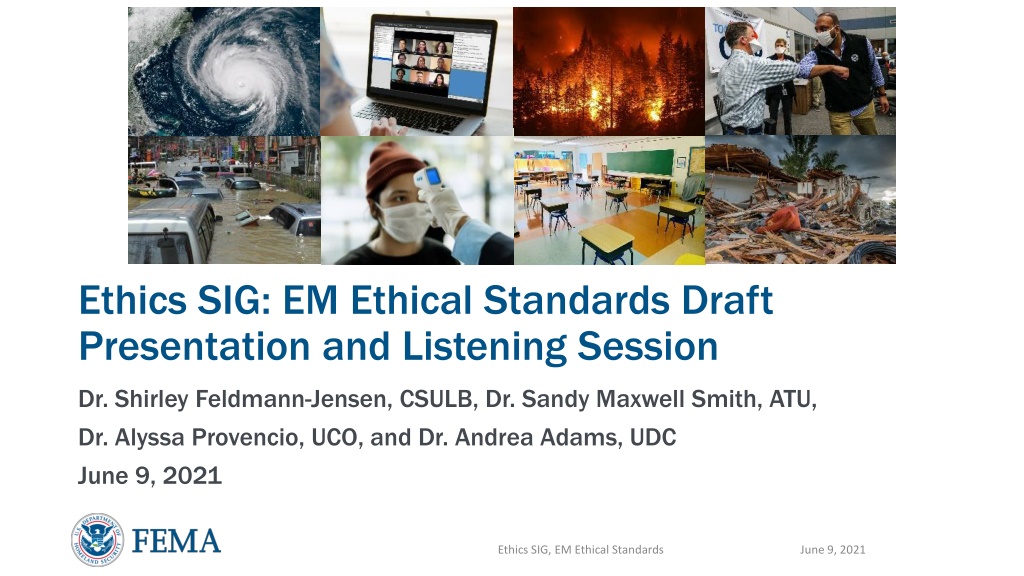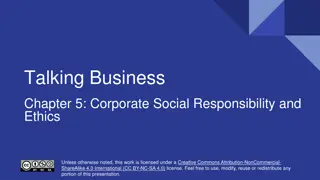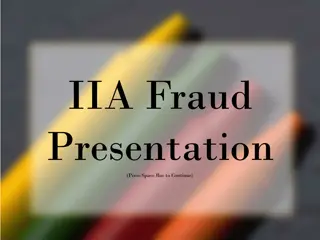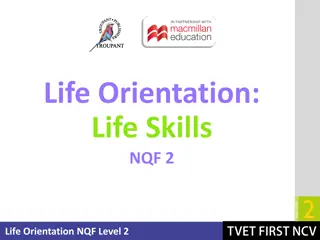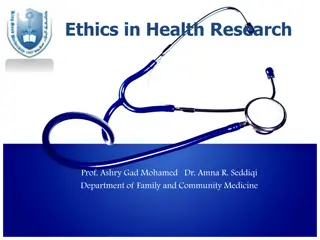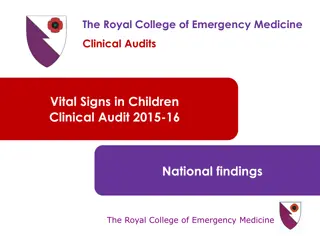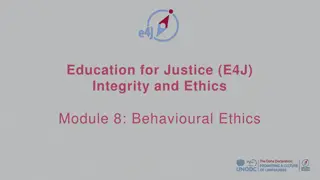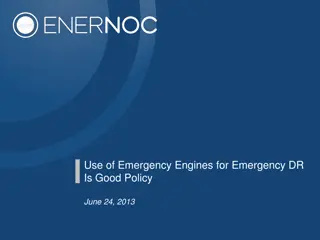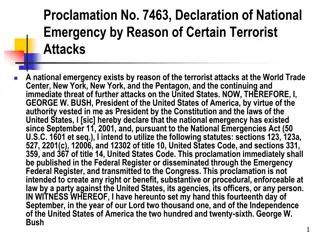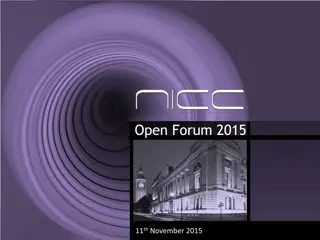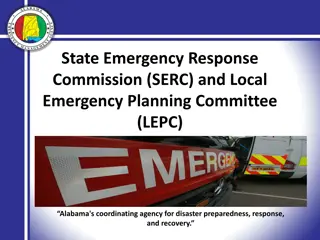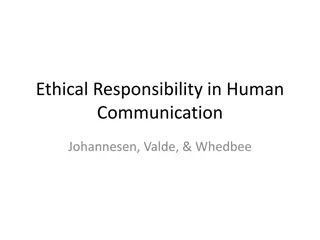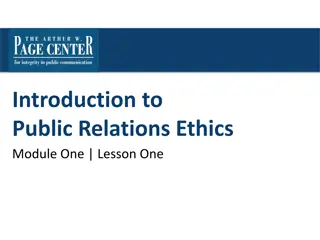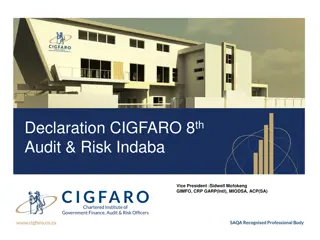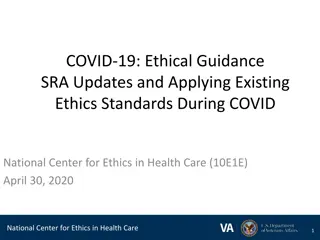Exploring Ethical Standards in Emergency Management: Presentation Highlights
This presentation and listening session focused on discussing ethical values in emergency management across various domains such as action, research, and policy. Presenters, including Dr. Shirley Feldmann-Jensen and other notable professionals, shared insights and objectives aimed at developing an ethical framework for emergency management. Key themes explored included fairness in treating victims, addressing issues of access and equity, and the importance of community engagement. The session also highlighted student perspectives on providing emergency guidance, allocating resources appropriately, and ensuring no harm is done, especially to vulnerable communities.
Download Presentation

Please find below an Image/Link to download the presentation.
The content on the website is provided AS IS for your information and personal use only. It may not be sold, licensed, or shared on other websites without obtaining consent from the author. Download presentation by click this link. If you encounter any issues during the download, it is possible that the publisher has removed the file from their server.
E N D
Presentation Transcript
Ethics SIG: EM Ethical Standards Draft Presentation and Listening Session Dr. Shirley Feldmann-Jensen, CSULB, Dr. Sandy Maxwell Smith, ATU, Dr. Alyssa Provencio, UCO, and Dr. Andrea Adams, UDC June 9, 2021 Ethics SIG, EM Ethical Standards June 9, 2021
Presenters Dr. Shirley Feldmann-Jensen, Lecturer & Program Coordinator, Emergency Services Administration, California State University at Long Beach Dr. Sandy Maxwell Smith, Professor & Department Head, Emergency Management, Arkansas Tech University Dr. Alyssa Provencio, Assistant Professor, Department of Political Science and Public Administration, University of Central Oklahoma Dr. Andrea Adams, Assistant Professor, Crime Justice and Security Program, University of the District of Columbia Ethics SIG, EM Ethical Standards June 9, 2021
Presentation Objectives 1. Continue an in-depth dialogue about the ethical values for EM in the domains of action, research, and policy. 2. Move collectively toward a recognized EM ethical framework; review the draft document and conduct a listening session. 3. Participants will contribute feedback to the Ethic SIG s ongoing work. Ethics SIG, EM Ethical Standards June 9, 2021
Global Ethics Day Video Contest Goals: to elevate the issues of access & equity in emergency management & inform an Ethics Course Module on this topic. The Global Ethics Day commemoration is conducted by the Carnegie Council Video competition: October 21, 2020 February 28, 2021. Provided 9 scholarships to winning students Solicited student feedback regarding issues of access & equity via survey Ethics SIG, EM Ethical Standards June 9, 2021
Student Themes Regarding Issues of Access & Equity in Emergency Management Treat victims fairly Without personal feelings Know where vulnerable live Without bias, without regard to need, race Engage Communities Whole and vulnerable Poor neighborhoods treated differently Trust Ethics SIG, EM Ethical Standards June 9, 2021
Student Themes Regarding Issues of Access & Equity in Emergency Management, continued Provide Emergency Guidance Provide Greater Resources Do No Harm Poor communities have limited resources Expand response channels Resources not known Need escape guide Work with community on disaster policy Keep funds flowing Don t punish Good Samaritans Ethics SIG, EM Ethical Standards June 9, 2021
Ethics Course Module Scenario for Role Play & Debriefing Scenario developed based on Hurricanes Laura & Delta in 2020 Questions posed in scenario to identify ethical, access & equity issues, & then develop questions for the incident commander leading the response Learners utilize information from literature review to help answer the questions A debriefing practice is used to discuss the issues & develop a mitigation strategy Short assessment of learning Ethics SIG, EM Ethical Standards June 9, 2021
Curriculum & Resource & Cataloging Curriculum Module Topics Ethical Principles for EM Ethical Decision-Making & Ethical Dilemmas in EM Ethical Leadership in EM Public Health Ethics Ethics and Populations at Risk/Vulnerable Groups Access and Equity (Global Ethics Day) Integrating Ethical Practices with Stakeholder Engagement Ethics Information Communication Technologies (ICTs) and EM Ethics, Technology, and Emergent Groups in situ Ethical Framework Ethics SIG, EM Ethical Standards June 9, 2021
Ethics SIG, EM Ethical Standards June 9, 2021
Foundational Tenets of EM Professional Code of Ethics Think Think ethically, act morally. Obey Obey the law. Maximize the good done for people and society, taking into consideration the needs of the most vulnerable. Maximize Respect the rights of people and organizations; fulfill duties and obligations to those served. Respect Build Build trusting relationships. Use When faced with an ethical dilemma, use an ethical decision-making process. Ethics SIG, EM Ethical Standards June 9, 2021
DRAFT EM Professional Code of Ethics Standards Responsibility to Affected Populations: Standards 1-6 Responsibility to the Partners, Stakeholders, and Public: Standards 7-15 Responsibility to the Environment: Standards 16 & 17 Responsibility to Colleagues: Standards 18-20 Responsibility to Employers: Standards 21-23 Responsibility to the Profession: Standards 24-27 Responsibility to Self: Standards 28-31 Ethics SIG, EM Ethical Standards June 9, 2021
DRAFT Code of EM Professional Conduct Responsibility to Affected Populations STANDARD 1: Emergency management professionals recognize that diversity in needs, resources, abilities, cultures, beliefs, and societal equity exist within affected populations and treat all affected populations interests and needs in a fair, equitable, compassionate, and sustainable manner. STANDARD 2: Emergency management professionals work to provide services equitably without discrimination or preference based on age, ethnicity, culture, race, ability, gender, language preference, religion, sexual orientation, socioeconomic status, nationality, or other historically oppressed groups. Ethics SIG, EM Ethical Standards June 9, 2021 12
DRAFT Code of EM Professional Conduct Responsibility to Affected Populations STANDARD 3: Emergency management professionals understand that those they serve rely on their expertise and guidance to communicate clearly, effectively, and appropriately regarding risks in an effort to engage citizens (before, during, and after an event). STANDARD 4: Emergency management professionals collaborate with stakeholders to understand vulnerabilities, exposures, threats, and the unique characteristics of communities in determining appropriate risk reduction. Ethics SIG, EM Ethical Standards June 9, 2021 13
DRAFT Code of EM Professional Conduct Responsibility to Affected Populations STANDARD 5: Emergency management professionals advance the development and implementation of programs, plans, strategies, and initiatives to ensure life safety, reduce or eliminate damage to property and the environment, and ensure quality of life. STANDARD 6: Emergency management professionals create and maintain robust, effective relationships with a wide variety of partners to build and safeguard capability and capacity. Ethics SIG, EM Ethical Standards June 9, 2021 14
DRAFT Code of EM Professional Conduct Responsibility to the Partners, Stakeholders, and Public STANDARD 7: Emergency management professionals create and maintain robust, effective relationships with a wide variety of partners. STANDARD 8: Emergency management professionals are aware of, and operate within, applicable laws and regulations (except in very rare cases where the application of a law or regulation is immoral). STANDARD 9: Emergency management professionals advocate for change in programs, policies, regulations, and laws that conflict with the ethical and effective practice of emergency management. Ethics SIG, EM Ethical Standards June 9, 2021 15
DRAFT Code of EM Professional Conduct Responsibility to the Partners, Stakeholders, and Public STANDARD 10: Emergency management professionals accurately represent their qualifications. STANDARD 11: Emergency management professionals support and guide evidence-based choices by clearly communicating science and complex issues. STANDARD 12: Emergency management professionals stay informed about emerging and evolving threats, new research and practice standards, and relevant tools and technologies. Ethics SIG, EM Ethical Standards June 9, 2021 16
DRAFT Code of EM Professional Conduct Responsibility to the Partners, Stakeholders, and Public STANDARD 13: Emergency management professionals remain current on social, environmental, technological, and political issues that may affect public risk. STANDARD 14: Emergency management professionals remain cognizant of power and status differentials and ensure that they maintain ethical and professional relationships. STANDARD 15: Emergency management professionals make sound fiscal decisions that support effective practice and the stewardship of resources. Ethics SIG, EM Ethical Standards June 9, 2021 17
DRAFT Code of EM Professional Conduct Responsibility to the Environment STANDARD 16: Emergency management professionals understand the interconnectedness, interdependence, and sensitivities between the human, built, and natural environments. STANDARD 17: Emergency management professionals recognize the important role the natural environment plays in mitigating risks associated with natural hazards and seek to protect the natural environment from harm and, where possible, nurture its recovery. Ethics SIG, EM Ethical Standards June 9, 2021 18
DRAFT Code of EM Professional Conduct Responsibility to Colleagues STANDARD 18: Emergency management professionals support and assist other emergency management professionals in meeting and elevating practice standards to include coordination and collaboration to share personnel, materials, and resources with colleagues. STANDARD 19: Emergency management professionals refrain from publicly disparaging other emergency management professionals. Ethics SIG, EM Ethical Standards June 9, 2021 19
DRAFT Code of EM Professional Conduct Responsibility to Colleagues STANDARD 20: Emergency management professionals respond appropriately to unethical and problematic behavior of emergency management colleagues; this may involve talking directly with the colleague or may require further action (such as reporting the colleague's behavior to an appropriate party or organization). Ethics SIG, EM Ethical Standards June 9, 2021 20
DRAFT Code of EM Professional Conduct Responsibility to Employers STANDARD 21: Emergency management professionals take direction from employers without deviating from ethical standards. STANDARD 22: Emergency management professionals have a duty to provide employers with all available relevant facts, data, and resources so that they are able make informed decisions. STANDARD 23: Emergency management professionals, whether in formal or informal leadership roles, have an obligation to model and support ethical decision-making and to help create an organizational culture that promotes and encourages moral behavior. Ethics SIG, EM Ethical Standards June 9, 2021 21
DRAFT Code of EM Professional Conduct Responsibility to the Profession STANDARD 24: Emergency management professionals have a duty to further the standing of the profession through their words, behaviors, and actions. STANDARD 25: Emergency management professionals have an obligation to advocate for access and inclusion to secure a more representative and diverse professional community. Ethics SIG, EM Ethical Standards June 9, 2021 22
DRAFT Code of EM Professional Conduct Responsibility to the Profession STANDARD 26: Emergency management professionals promote the continuing development and improvement of their profession by encouraging membership in professional associations, supporting research endeavors, fostering educational advancement, providing mentorship, advocating for appropriate legislative actions, and engaging in other related professional activities. STANDARD 27: Emergency management professionals support and assist emergency management students in their learning and career development, including opportunities to engage in relevant internships and practicums, participate in training and practice activities, and contribute to meaningful work projects and initiatives. Ethics SIG, EM Ethical Standards June 9, 2021 23
DRAFT Code of EM Professional Conduct Responsibility to Self STANDARD 28: Emergency management professionals have a commitment to lifelong learning and to continually advance their knowledge and skills to serve their community and the profession. STANDARD 29: Emergency management professionals recognize how their cultural and social backgrounds, beliefs, values, and biases can affect competent and just service. Ethics SIG, EM Ethical Standards June 9, 2021 24
DRAFT Code of EM Professional Conduct Responsibility to Self STANDARD 30: Emergency management professionals are mindful of the ways in which stress can affect their physical and mental health and take appropriate self-care measures. STANDARD 31: Emergency management professionals will practice continual self-reflection focused on growth and development. Ethics SIG, EM Ethical Standards June 9, 2021 25
Please provide your comments via the Ethics Survey! The link for the survey is now live! https://ndstate.co1.qualtrics.com/jfe/form/SV_0VYUHiwPJYUar4O We also have a FaceBook page: https://www.facebook.com/EMEthics Presenter s Name, Title June 8 10, 2021 26
Contact Us! Dr. Shirley Feldmann-Jensen Shirley.Jensen@csulb.edu Dr. Sandy Maxwell Smith ssmith107@atu.edu Dr. Alyssa Provencio aprovencio@uco.edu Dr. Andrea Adams andrea.adams@udc.edu Ethics SIG, EM Ethical Standards June 9, 2021
